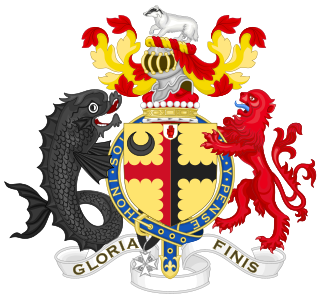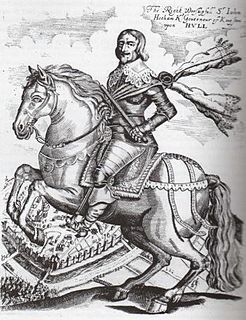
Battle Abbey is a partially ruined Benedictine abbey in Battle, East Sussex, England. The abbey was built on the site of the Battle of Hastings and dedicated to St Martin of Tours.

Earl of Huntingdon is a title which has been created several times in the Peerage of England. The medieval title was associated with the ruling house of Scotland.

Baron Hastings is a title that has been created three times. The first creation was in the Peerage of England in 1290, and is extant. The second creation was in the Peerage of England in 1299, and became extinct on the death of the first holder in c. 1314. The third creation was in the Peerage of England in 1461, and has been in abeyance since 1960.

Earl of Granard is a title in the Peerage of Ireland. It was created in 1684 for Arthur Forbes, 1st Viscount Granard. He was a lieutenant-general in the army and served as Marshal of the Army in Ireland after The Restoration and was later Lord Justice of Ireland. He had already succeeded his father as second Baronet of Castle Forbes and been created Baron Clanehugh and Viscount Granard in 1675, also in the Peerage of Ireland. The Baronetcy, of Castle Forbes in county Longford, was created in the Baronetage of Nova Scotia on 29 September 1628 for his father, Arthur Forbes.

Viscount Brookeborough, of Colebrooke in the County of Fermanagh, is a title in the Peerage of the United Kingdom. It was created in 1952 for the Ulster Unionist politician and Prime Minister of Northern Ireland, Captain The Rt. Hon. Sir Basil Brooke, 5th Bt., P.C. (N.I.), M.P.
Baron Muskerry is a title in the Peerage of Ireland. It was created in 1781 for Sir Robert Deane, 6th Baronet. He had previously represented County Cork in the Irish House of Commons.
Baron Hothfield, of Hothfield in the County of Kent, is a title in the Peerage of the United Kingdom. It was created in 1881 for Sir Henry Tufton, 2nd Baronet, who was appointed Lord Lieutenant of Westmorland the same year and who also served briefly as a government whip in the Liberal administration of 1886. His eldest son, the second Baron, notably served as Mayor of Appleby, Westmorland. On the death of his son, the third Baron, in 1961, this line of the family failed. The late Baron was succeeded by his first cousin, the fourth Baron. He was the only son of the Hon. Sackville Philip Tufton, second son of the first Baron. On his death in 1986 this line of the family also failed and the titles passed to his first cousin, the fifth Baron. He was the eldest son of the Hon. Charles Henry Tufton, third son of the first Baron. As of 2017 the titles are held by his son, the sixth Baron, who succeeded in 1991.

Marquess of Hastings was a title in the Peerage of the United Kingdom. It was created on 6 December 1816 for Francis Rawdon-Hastings, 2nd Earl of Moira.

Sir Francis Hastings Charles Doyle, 2nd Baronet was a British poet.
The Ashburnham Baronetcy, of Broomham in the County of Sussex, is a title in the Baronetage of England. It was created on 15 May 1661 for Denny Ashburnham, Member of Parliament for Hastings. He was the grandson of Adam Ashburnham, Member of Parliament for Winchelsea in 1592, who was the son of Laurence Ashburnham, and a descendant of Richard Ashburnham of Broomham, second son of Thomas Ashburnham, whose eldest son John was the ancestor of the Earls of Ashburnham. He was succeeded by his elder son, William, the second Baronet. He represented Hastings and Seaford in the House of Commons. He died childless in 1755 and was succeeded by his younger brother, Charles, the third Baronet. His son, William, the fourth Baronet, was Bishop of Chichester. On his death the title passed to his son, the fifth Baronet. He sat as Member of Parliament for Hastings.

The Sheriff is the oldest secular office under the Crown. Formerly the Sheriff was the principal law enforcement officer in the county but over the centuries most of the responsibilities associated with the post have been transferred elsewhere or are now defunct, so that its functions are now largely ceremonial.
There have been four baronetcies created for members of the Astley family, three in the Baronetage of England and one in the Baronetage of the United Kingdom. Only one creation is extant as of 2008. The Astley family were descended from Sir Thomas de Astley of Astley, Warwickshire, who was killed in the Battle of Evesham in 1265. He married twice. From his first marriage to Joane de Blois descended the Astley baronets of Patshull, whose family seat was at Patshull Hall, Staffordshire, and the Astley baronets of Everley, Wiltshire. From his second marriage to Editha Constable of Melton Constable, Norfolk, descended the Astley baronets of Melton Constable, the Astley baronets of Hillmorton, and the Barons Astley of Reading.
Three baronetcies were created for persons with the surname D'Oyly, two in the Baronetage of England and one in the Baronetage of the United Kingdom. One creation is extant as of 2008.
Events from the year 1771 in Ireland.

There have been two baronetcies created for persons with the surname Wheler, one in the Baronetage of England and one in the Baronetage of the United Kingdom. One creation is extant as of 2008.

Sir Charles Abney Hastings, 2nd Baronet of Willesley Hall, Derbyshire was both High Sheriff of Derbyshire and an MP for Leicester from 1826 to 1831.

Captain Sir Harold Malcolm Bullock, 1st Baronet MBE was a British soldier and Conservative Party politician.
There have been four creations of baronetcies with the surname Baker. They are listed in order of creation.
Sir Richard Fowler, 2nd Baronet (1681–1731), of Harnage Grange, Shropshire was an English politician.











